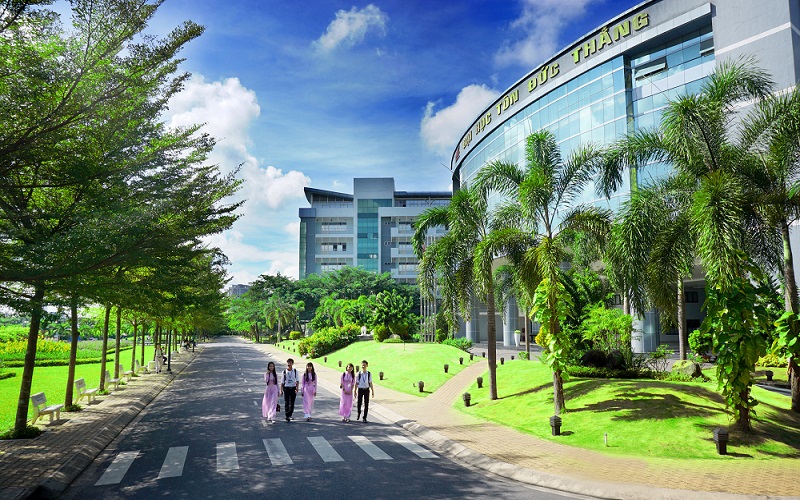1. Introduction
High quality program (HQP) on Software Engineering was built the demand of the labor market; linked theory with practice; combined professional and specialized knowledge with practicing practical skills; focused on soft skills and corporate internship.
Software Engineering program is designed to train students to become Software Engineers who master the software development process in a professional manner to create high-quality software products that meet the professional needs in society's production. Students are equipped with in-depth knowledge of the software industry, including software development process, skills to apply software tools to support the development of other software; necessary knowledge related to the implemented phases in a software project such as requirements collection, analysis, design, coding, testing, operation, and maintenance.
2. Highlights of the High quality program
The difference between HQP and the normal program is that it is taught by well-qualified lecturers and researchers. About 50% of the subjects are taught in English; students can practice in professionally certified environments; students also have an opportunity to study in a reputable university abroad, such as in Taiwan or the Czech Republic.
Students are organized in smaller groups (maximum 40 students for theoretical studies and up to 20 students for the practical training), with all modern facilities and a healthy learning environment. There is a team of very dynamic and enthusiastic lecturers and teaching assistants to teach and supervise the students in a highly professional manner, who are committed to producing highly efficient and competent students.
3. Training program
Software Engineering (high quality) - code: F7480103
- The Software Engineering (High Quality) program is offered in 8 semesters, with the total cumulative credits required for each student to graduate is 142 credits.
- Training method: training program in the form of concentration and management training under the credit system; Teaching methods are student-centered, enhancing students autonomy in learning.
- Especially with the vocational training program, students are trained by business experts and in the real enterprise environment.
Some modules of vocational certification have been integrated into the curriculum. Therefore, students can enroll themselves and they have the opportunity to obtain a vocational certificate. Students can register to attend the semester abroad in 3rd or 4th year with the cost of about 25 millions VND (without airfare and living expenses).
Army semesters are designed specifically for students who have studied National Defense Education and have experienced life in the military environment to help train their life skills, confidence, gratitude and effort.
4. Learning outcome:
In order to be considered for graduation, students must accumulate and meet the requirements according to the standards and skills specified in the curriculum and meet the standards.
- The Global Software Talent (GST) certificate issued by FPT, the Agile / Scrum certificate issued by Axon Active Software Company or other professional certificates.
- Certificate in International English IELTS 5.5 or TOEFL iBT 50 or equivalent.
- Achieve extra curricular activities as required by the program.
- Get soft skills, professional skills.
5. Career prospects
Software Engineering engineers acquire the skills needed to engage in software projects with different roles such as:
- Business Analyst (BA)
- Software Architect (SA)
- Developer
- Software Tester
- Bridge System Engineer (BrSE)
Students after graduation, have the knowledge and skills necessary to be able to learn new technologies themselves to develop a long-term career, they can develop software to meet the real needs arising from social reality, or they can also set up their own companies. The students develop a strong foundation of knowledge and ability to do research in order to continue their study at a higher level. Excellent students can be considered to pursue master's or doctoral level of the Faculty of Information Technology, Ton Duc Thang University.
6. The Expected Learning Outcomes (ELOs) is the starting point of the curriculum design process and is built according to a rigorous, scientific process in which it reflects the vision and mission of the university and faculties and is suitable to the course objectives and meets the needs of stakeholders.
The ELOs will be concretized according to the principle of "directional compatibility" in step-by-step subjects to help learners gain professional qualifications & skills in knowledge, skills, attitudes and professional responsibilities after completing the training program. The content of the program also enhances group work activities, training habits of active self-studies and creative thinking for students to be proactive and ready for development opportunities.
The ELOs are committed by the University to students, society and published on the Website.
>> ELO
7. The curriculum is a system of theoretical and practical knowledge that is designed synchronously with the method of teaching, learning and evaluating learning outcomes to ensure learners accumulate knowledge, gain the necessary competencies according to the published expected learning outcomes corresponding to the university level. The curriculum of Ton Duc Thang University is built in a way that is compatible with the program of the world's TOP 100 universities according to the rankings of QS and THE but is adjusted to suit the conditions and realty in Vietnam and the training target of Ton Duc Thang University.
Periodically, the university reviews and evaluates the curriculum to ensure that the students meet the requirements of society in terms of professionalism after graduation as well as update the changes in technology and new business methods, etc. This process has the full participation of key stakeholders including scientists, employers, alumni, students, and lecturers. The TOP 100 program has been delivered by the university since 2015 to train human resources to meet the labor market and global integration trend, to help students to be more active and self-study, to approach the latest training approaches in the world.
The curriculums are published to students through student portal and on the website.
>> curriculum before 2015, curriculum 2015, curriculum

